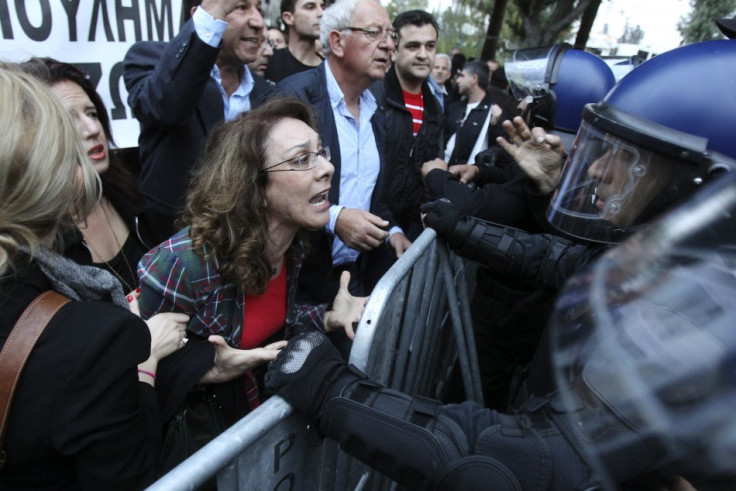Cyprus Weighs Plan to Seize 25 Percent Of Big Bank Deposits

Cyprus is weighing up last-ditch plans to seize a quarter of the deposits of large account holders at its biggest bank in a bid to raise the funds required to meet EU bailout demands and avert financial collapse.
The island's finance minister said officials had made "significant progress" in talks with the "troika" of the EU, the European Central Bank and the International Monetary Fund aimed at securing the deal.
Michael Sarris said Cyprus was considering imposing the 25 percent one-off tax on deposits of more than €100,000 (£85,000) in its biggest bank. Cyprus must raise €5.8bn before Monday to secure the €10bn loan.
The Cypriot parliament has approved measures to restructure the island's banks, set up a "national solidarity fund", and establish capital controls. But it rejected a proposed tax on smaller deposits earlier this week, before EU pressure brought the plan back to the table.
"Significant progress has been made towards an agreement at least with the troika which will report to the Eurogroup," said Sarris. "Two or three issues need further work."
Talks aimed at finalising the package would resume in the afternoon, he said. Cypriot President Nicos Anastasiades and party leaders are due in Brussels as attempts to secure the rescue package go to the wire.
The European Central Bank has given Cyprus until Monday to raise the bailout money. The Eurogroup of 17 eurozone finance ministers will meet to discuss the Cyprus bailout on Sunday evening, its president Jeroen Dijsselbloem said.
If Cyprus fails, the ECB said it would cut off funds to the banks, leading almost inevitably to bankruptcy, the collapse of its banks, exit from the eurozone, and little alternative but the introduction of a new and largely worthless currency.
Cyprus must now determine what funding measures the EU will accept before putting them to a vote. Leading Cypriot bankers have urged parliament to accept a levy, with small savers exempted.
The initial proposals provoked anger among ordinary savers and large-scale foreign investors, many of them Russian.
Sarris was rebuffed by Russia this week after travelling to Moscow for talks on alternative funding methods. Russia said it would only act after the EU reached a deal with Cyprus.
Among nine bills approved on Friday, Cyprus MPs voted to restructure the banking sector, starting with the second-largest and most troubled lender, Laiki Bank.
Under the restructuring, lenders will be split into "good" and "bad" banks, protecting smaller deposits but allowing larger ones to be taxed.
There is growing speculation that the biggest lender, the Bank of Cyprus, will also be restructured.
Parliament also voted to impose capital controls to prevent a large-scale flight of funds from the island.
Banks in Cyprus have been closed since Monday and many businesses are only taking cash payments.
In an election year in Germany, Chancellor Angela Merkel needed to avoid being accused of using "German taxpayers' money to pay off Russian oligarchs", said Anthanasios Orphanides, the former governor of the Cyprus Central Bank.
If bailout talks fail, the European Central Bank says it will cut off emergency cash to the island's over-sized and stricken banks, spelling certain collapse and a potential exit from Europe's single currency.
The tax is unprecedented in a European debt crisis that has spread from Greece to Ireland, Portugal, Spain and Italy.
About half of the island's depositors are thought to be non-resident Russians. European authorities believe much of the cash held in Cypriot banks belongs to Russian money launderers.
© Copyright IBTimes 2024. All rights reserved.





